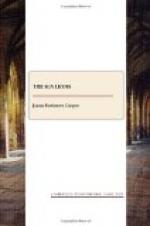To render the obstinacy of the other crew more apparent, Daggett had been obliged to do the same! Much of his beloved craft had already disappeared in the camboose, and more was likely to follow. This compelled destruction, however, rather increased than lessened his pertinacity. He clung to the last chip; and no terms of compromise would he now listen to at all. The stranded wreck was his, and his people’s; while the other wreck belonged to the men from Oyster Pond. Let each party act for itself, and take care of its own. Such were his expressed opinions, and on them he acted.
This state of things had not been brought about in a day. Months had passed; Roswell had seen his last billet of wood put in the camboose; had tried various experiments for producing heat by means of oil, which so far succeeded as to enable the ordinary boiling to be done, thereby saving wood; but, when a cold turn set in, it was quickly found that the schooner must go, or all hands perish. When this decree went forth, every one understood that the final preservation of the party depended on that of the boats. For one entire day the question had been up in general council, whether or not the two whale-boats should be burnt, with their oars and appurtenances, before the attack was made on the schooner itself. Stimson settled this point, as he did so many others, Roswell listening to all he said with a constantly increasing attention.
“If we burn the boats first,” said the boat-steerer, “and then have to come to the schooner a’ter all, how are we ever to get away from this group? Them boats wouldn’t last us a week, even in our best weather; but they may answer to take us to some Christian land, when every rib and splinter of the Sea Lion is turned into ashes. I would begin on the upper works of the schooner first, Captain Gar’ner, resarvin’ the spars, though they would burn the freest. Then I would saw away the top-timbers, beams, decks, transoms, and everything down within a foot of the water; but I wouldn’t touch anything below the copper, for this here reason: unless Captain Daggett sets to work on his craft and burns her up altogether, we may find mater’als enough in the spring to deck over ag’in the poor thing down there in the cove, and fit her out a’ter a fashion, and make much better weather of it in her than in our boats. That’s my opinion, sir.”
It was decided that this line of conduct should be pursued. The upper works of the schooner were all taken out of her as soon as the weather permitted, and the wood was carried up and stored in the house. Even with this supply, it was soon seen that great economy was to be used, and that there might be the necessity of getting at the vessel’s bottom. As for the schooner, as the people still affectionately called the hull, or what was left of the hull, everything had been taken out of her. The frozen oil was carried up to the house in chunks, and used for fuel and lights. A good deal of heat was obtained




